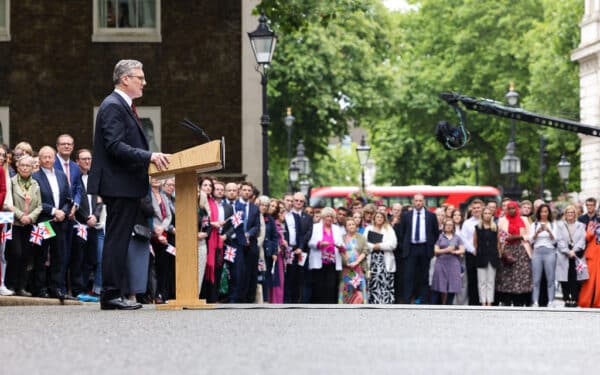A day that was expected to see Keir Starmer in the political firing line has instead culminated in roughly two-thirds of MPs fuming at Sir Lindsay Hoyle, the Commons Speaker.
Starmer himself is not included within this 66.6 per cent. On the contrary, Hoyle has saved him from a likely mass rebellion of Labour MPs.
Today, the SNP tabled an opposition day debate on Gaza, calling for “an immediate ceasefire” and condemning the “collective punishment” of Palestinians.
Fearful of another bruising rebellion resembling November’s, which saw 56 Labour MPs join with the Scot Nats to demand a ceasefire, Starmer shifted his party’s official position. For the first time, he backed calls for an immediate humanitarian ceasefire in Gaza.
So the two parties finally align? Not quite. While shifting its position towards the SNP, Labour made clear that it was not content with the finer details of the SNP’s motion, which makes no mention of Hamas’s 7 October attack on Israel. Starmer tabled an amendment, calling for an immediate ceasefire, but emphasising the role Hamas must play as well as Israel in ensuring any ceasefire lasts.
The Conservative government, meanwhile, tabled its own amendment calling for an “immediate humanitarian pause as the best way to stop the fighting and to get aid in and hostages out”, re-affirming Israel’s “right to self-defence” and supporting moves “towards a permanent sustainable ceasefire”. In pushing for a pause not a ceasefire, Sunak and Starmer’s positions on Gaza have markedly diverged for the first time in four months.
So how does all of this make a villain of Sir Lindsay Hoyle?
Because it is highly unusual for a speaker to allow an opposition party (Labour) to amend a motion from another opposition party (the SNP).
It was anticipated that MPs would almost certainly only get a chance to vote on the SNP’s ceasefire motion and the government’s amendment. Meaning a significant chunk of Labour MPs would likely have gone against Starmer and backed the SNP’s own ceasefire wording.
But it never came to that. The speaker made a rare call to allow MPs to vote on the proposals put forward by all three parties.
Noting the highly emotive nature of the subject in question, Hoyle reasoned, “I think it’s important on this occasion that this House is able to consider the widest possible range of options.”
Thanks to Hoyle, the SNP’s attempt to expose divisions within the Labour Party on Gaza failed.
“This is the SNP’s opposition day. What’s the point if it’s going to be done like this?”, protested the SNP MP Owen Thompson.
It is a blow for the Scot Nats because it had planned to use this debate to set out what it saw as its distinctive position among Westminster’s biggest parties on Gaza. And its MPs were anticipating evening headlines about Labour rejecting SNP calls for a ceasefire.
Tories in the Commons appeared similarly furious that Hoyle had shielded Starmer from a damaging rebellion, with chants of “Bring back Bercow” resounding from its benches.
Others might object to the cynical nature of the whole exercise, and the political game-playing over such a profoundly serious issue.
Write to us with your comments to be considered for publication at letters@reaction.life




